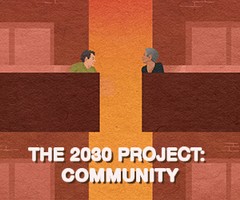Image: ATTA KENARE/AFP via Getty Images
The pandemic has been isolating. How do we build community in a fractured world? VMG’s 2030 Project residents interrogate how we can build a shared future, together.
Advertisement
“What I want as an individual in order for us to survive, in order for us to see the future, we need to unite,” Soroush said. “And I feel like our generation understands that.”
